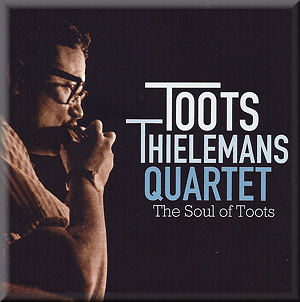1. You Are My Sunshine
2. Nuages
3. Five O'Clock Whistle
4. Soul
5. Lonesome Road
6. Misty
7. Confirmation
8. Les Enfants s'ennuient le Dimanche
9. Brother John
10. Don't Be That Way
11. Scotch on the Rocks
12. Diga Diga Doo
13. Sonny Boy
14. In a Sentimental Mood
15. Cool and Easy
16.Tangerine
17. Can't Help Lovin' Dat Man
Toots Thielemans - Harmonica, electric guitar, whistling
Ray Bryant - Piano (tracks 1-13)
Tommy Bryant - Bass (tracks 1-9)
Oliver Jackson - Drums (tracks 1-9)
Wendell Marshall - Bass (tracks10-13)
Bill Clark - Drums (tracks 10-13)
Hank Jones - Piano (tracks 14-17)
Doug Watkins - Bass (tracks 14-17)
Art Taylor - Drums (tracks 14-17)
Toots Thielemans is renowned as one of the few notable harmonica players in jazz. He may be less familiar as a guitarist and whistler, although he played guitar as well as harmonica during his long stint with George Shearing in the 1950s. He fulfils all three roles on this album, which originally appeared in 1959 as an LP with just the first nine tracks. Extra tracks have been added from sessions in 1955 (tracks 10-13) and 1958 (tracks 14-17), making this a well-filled CD.
Toots is most distinctive as a harmonica player, with an enviable technique and fine jazz feeling. He is good enough as a guitarist but not particularly outstanding, depending mainly on playing single notes rather than chords. He is understandably reminiscent of Django Reinhardt in Django's composition Nuages - and he admits that Django was one of his earliest influences. However, his guitar work is heard at its best in such tracks as Confirmation and a swinging version of Lonesome Road, which also includes some good drum breaks by Oliver Jackson. Ray Bryant's quicksilver piano is heard to advantage on Confirmation, and his blues-based style adds a down-to-earth quality to the first 13 tracks.
Les Enfants s'ennuient le Dimanche means "Children are bored on Sunday" and it was written by singer Charles Trenet. Thielemans gives it a semi-classical opening before going into swing. Toots composed SouI and Brother John - the latter being a jazz waltz on which Toots whistles as well as playing guitar. But it is Thielemans' harmonica that makes the most impact throughout the album, and you can see from the track listing what a varied and off-the-wall repertoire he has.
The harmonica is sometimes called the mouth organ and regarded with contempt, but Toots has established it as a serious instrument capable of embracing all kinds of moods.
Tony Augarde
